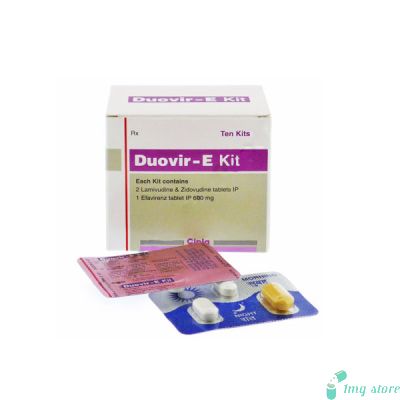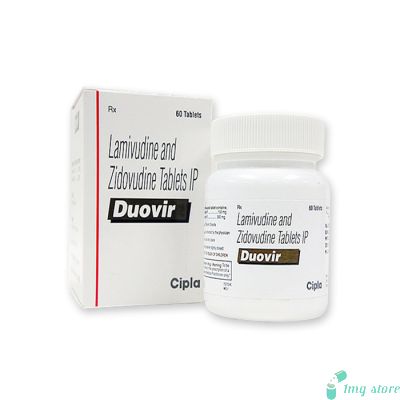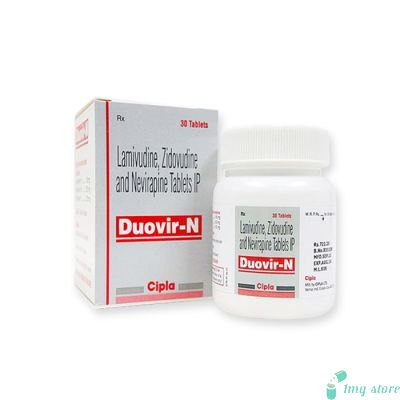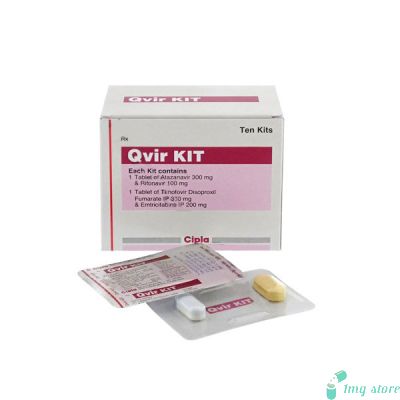Lamivir HBV Tablet (Lamivudine)
Lamivudine Tablet, marketed under the brand name Lamivir HBV, is an antiviral medication used to treat chronic hepatitis B virus (HBV) infection and human immunodeficiency virus (HIV) infection.
Introduction to Lamivudine Tablet (Lamivir HBV):
Lamivudine Tablet, marketed under the brand name Lamivir HBV, is an antiviral medication used to treat chronic hepatitis B virus (HBV) infection and human immunodeficiency virus (HIV) infection. It belongs to a class of drugs called nucleoside reverse transcriptase inhibitors (NRTIs). Lamivudine works by inhibiting the reverse transcriptase enzyme, which is essential for the replication of the virus. By blocking this enzyme, Lamivudine helps to reduce the viral load and improve liver function in HBV-infected individuals. In HIV-infected patients, it helps to suppress the virus, delay the progression of the disease, and improve the immune system. Nevertheless, Lamivudine is considered a life-saving drug for individuals infected with chronic hepatitis B or HIV. It plays a crucial role in suppressing the viral replication, reducing the viral load, and improving the immune system. By effectively managing these infections, Lamivudine helps to prevent disease progression, reduce morbidity and mortality, and improve the overall quality of life for patients living with these conditions.
Dosage information of Lamivudine Tablet:
The dosage of Lamivudine Tablet depends on the condition being treated and the individual's age, weight, and medical history. It is important to follow the prescribed dosage and instructions provided by the healthcare professional or mentioned on the product label. The usual recommended dosages for Lamivudine are as follows:
Chronic Hepatitis B Virus (HBV) Infection:
Adults and Adolescents (over 16 years old): The recommended dose is 100 mg (one Lamivudine Tablet) once daily.
Pediatric patients (2 to 16 years old): The dosage is based on the child's weight. The usual recommended dose is 3 mg per kg of body weight, up to a maximum of 100 mg per day.
Human Immunodeficiency Virus (HIV) Infection:
Adults and Adolescents (over 16 years old): The recommended dose is 300 mg (one Lamivudine Tablet) once daily or 150 mg (half a tablet) twice daily, in combination with other antiretroviral drugs.
Pediatric patients (2 to 16 years old): The dosage is based on the child's weight. The usual recommended dose is 4 mg per kg of body weight, up to a maximum of 150 mg twice daily.
It is important to take Lamivudine Tablet regularly and at the same time each day to ensure the maximum benefit. The tablet can be taken with or without food. If a dose is missed, it should be taken as soon as possible. However, if it is almost time for the next scheduled dose, the missed dose should be skipped and the regular dosing schedule should be followed.
Epivir and Epivir HBV: Epivir is another brand name for Lamivudine. It is used for the treatment of HIV infection and is often prescribed in combination with other antiretroviral drugs. Epivir HBV is a specific formulation of Lamivudine that is used for the treatment of chronic HBV infection. Both medications contain the same active ingredient, Lamivudine, but are indicated for different viral infections.
Lamivudine Tablet for HIV: Lamivudine Tablet is commonly used as part of combination therapy for the treatment of HIV infection. It helps to suppress the replication of the virus, reduce the viral load, and delay the progression of the disease. However, it is important to note that Lamivudine should always be used in combination with other antiretroviral drugs as prescribed by a healthcare professional.
Lamivudine Tablet generic name: The generic name of Lamivudine Tablet is simply "Lamivudine." Generic drugs contain the same active ingredient as their brand-name counterparts and are often more affordable. Lamivudine is available under various brand names, including Lamivir HBV and Epivir, among others.
Precautions:
Allergic Reactions: Before starting Lamivudine Tablet, it is important to inform your healthcare professional about any known allergies to Lamivudine or other medications. If you experience signs of an allergic reaction, such as rash, itching, swelling, severe dizziness, or difficulty breathing, seek immediate medical attention.
Hepatitis B Flare-up: In some cases, discontinuation of Lamivudine Tablet may lead to a temporary worsening of hepatitis B infection. Therefore, it is crucial to consult with your healthcare provider before stopping the medication, as abrupt discontinuation can cause a flare-up of the virus.
Kidney and Liver Function: Lamivudine is primarily eliminated from the body through the kidneys. It is important to monitor kidney function regularly, especially in patients with pre-existing kidney disease. Additionally, since Lamivudine is primarily metabolized by the liver, individuals with liver impairment should use Lamivudine with caution and under medical supervision.
HIV Resistance: Lamivudine should always be used in combination with other antiretroviral drugs to minimize the risk of developing drug resistance. Compliance with the prescribed treatment regimen is essential to achieve optimal therapeutic outcomes.
Lamivudine, though primarily used for the treatment of chronic hepatitis B and HIV infections, has also shown some potential as an anti-cancer agent.
Uses of Lamivudine Tablet:
Treatment of Chronic Hepatitis B Virus (HBV) Infection: Lamivudine Tablet is indicated for the treatment of chronic HBV infection. It helps to reduce the viral load, improve liver function, and prevent the progression of liver damage associated with HBV.
Treatment of Human Immunodeficiency Virus (HIV) Infection: Lamivudine Tablet is also used in combination with other antiretroviral drugs for the treatment of HIV infection. It helps to suppress the replication of the virus, reduce the viral load, delay the progression of the disease, and improve the immune system.
Lamivudine Tablet is not a cure for HBV or HIV infection, but it can effectively control the viruses and improve the patient's condition. It is important to continue taking the medication as prescribed, even if the symptoms improve, to prevent the development of drug resistance.
Common side effects: The most common side effects of Lamivudine Tablet include headache, nausea, diarrhea, fatigue, abdominal pain, cough, and nasal congestion. These side effects are usually mild and resolve on their own without any specific treatment.
Hematologic effects: Lamivudine can cause hematologic abnormalities, including decreased red blood cell count (anemia), decreased white blood cell count (neutropenia), and decreased platelet count (thrombocytopenia). Regular monitoring of blood counts is necessary, especially in patients with pre-existing blood disorders.
Hepatic effects: Lamivudine may rarely cause liver problems, including hepatomegaly (enlarged liver), hepatotoxicity (liver toxicity), and lactic acidosis (a rare but potentially life-threatening condition). Seek immediate medical attention if you experience symptoms such as yellowing of the skin or eyes, dark urine, abdominal pain, or unexplained fatigue.
Pancreatitis: Although rare, Lamivudine has been associated with pancreatitis (inflammation of the pancreas). Seek medical help if you experience severe abdominal pain, persistent nausea and vomiting, or other signs of pancreatitis.
Immune Reconstitution Syndrome: In HIV-infected individuals with severe immune deficiency, immune reconstitution syndrome may occur after initiation of antiretroviral therapy, including Lamivudine. This syndrome is characterized by the sudden onset of inflammatory reactions to opportunistic infections or tumors, which may necessitate further medical evaluation and treatment.
Can Lamivudine Tablet be used during pregnancy?
Lamivudine Tablet is generally considered safe to use during pregnancy. It is classified as a pregnancy category C drug, which means that studies in animals have shown some adverse effects on the fetus, but there are no well-controlled studies in pregnant women. The benefits of using Lamivudine in pregnant women with HIV or chronic HBV infection usually outweigh the potential risks. It is important to discuss the potential benefits and risks with a healthcare professional before initiating Lamivudine treatment during pregnancy.
Can Lamivudine Tablet be used in children?
Yes, Lamivudine Tablet can be used in children, both for the treatment of HIV infection and chronic HBV infection. The dosage is based on the child's weight, and it is important to follow the prescribed dosage and instructions provided by the healthcare professional. Pediatric patients may require more frequent monitoring of their blood counts and liver function tests.
Can Lamivudine Tablet be taken with food?
Yes, Lamivudine Tablet can be taken with or without food. It does not significantly affect the absorption of the medication. However, it is important to take Lamivudine consistently, either with food or without food, to maintain a steady level of the drug in the body.
Can Lamivudine Tablet cure hepatitis B or HIV infection?
No, Lamivudine Tablet cannot cure hepatitis B or HIV infection. It is an antiviral medication that helps to suppress the replication of the viruses, reduce the viral load, and improve the immune system. It is important to continue taking Lamivudine as prescribed, even if the symptoms improve, to prevent the development of drug resistance.
Can Lamivudine Tablet be used as a single therapy for HIV infection?
No, Lamivudine Tablet should always be used in combination with other antiretroviral drugs for the treatment of HIV infection. Using Lamivudine as a monotherapy can lead to the development of drug resistance and limit the effectiveness of the treatment. Combination therapy is necessary to achieve optimal suppression of the virus and delay the progression of the disease.
Zidovudine: Co-administration of Lamivudine and zidovudine (another antiretroviral medication) may increase the risk of hematologic toxicities, such as anemia or neutropenia. Close monitoring of blood counts is recommended when these medications are used together.
Ribavirin: When Lamivudine is used in combination with ribavirin (a medication used to treat hepatitis C), there is a potential for anemia. Regular monitoring of hemoglobin levels is necessary in patients receiving this combination therapy.
Didanosine: Concurrent use of Lamivudine and didanosine (another antiretroviral medication) may increase the risk of pancreatitis. Close monitoring for signs and symptoms of pancreatitis, such as severe abdominal pain or persistent nausea and vomiting, is essential.
Interferon-Alpha: Combining Lamivudine with interferon-alpha (used in the treatment of hepatitis B and C) may increase the risk of peripheral neuropathy. Close monitoring for signs and symptoms of neuropathy, such as numbness, tingling, or pain in the extremities, is recommended.
It is important to inform your healthcare provider about all the medications, including prescription, over-the-counter, and herbal products, that you are taking to avoid potential drug interactions.
| Manufacturer | : | Cipla Pharma, India |
| Equivalent Brand | : | Epivir |
| Generic Search | : | Lamivudine |














